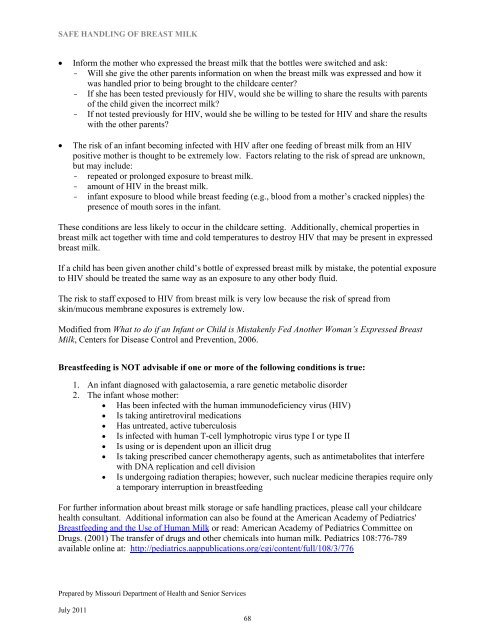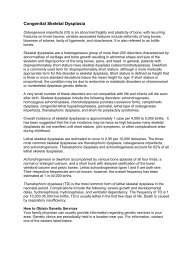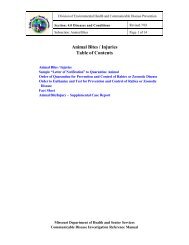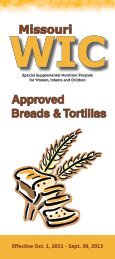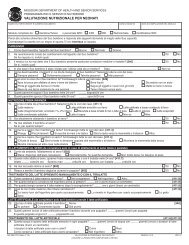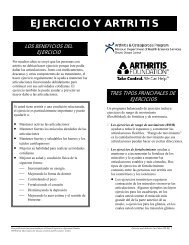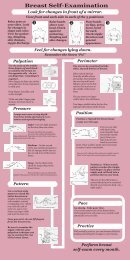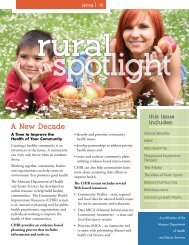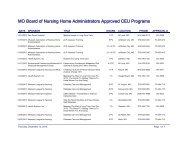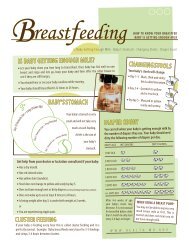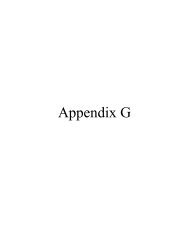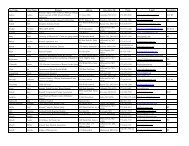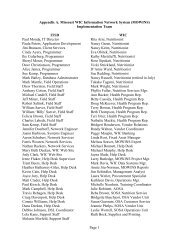Prevention and Control of Communicable Diseases - Missouri ...
Prevention and Control of Communicable Diseases - Missouri ...
Prevention and Control of Communicable Diseases - Missouri ...
You also want an ePaper? Increase the reach of your titles
YUMPU automatically turns print PDFs into web optimized ePapers that Google loves.
SAFE HANDLING OF BREAST MILK<br />
� Inform the mother who expressed the breast milk that the bottles were switched <strong>and</strong> ask:<br />
- Will she give the other parents information on when the breast milk was expressed <strong>and</strong> how it<br />
was h<strong>and</strong>led prior to being brought to the childcare center?<br />
- If she has been tested previously for HIV, would she be willing to share the results with parents<br />
<strong>of</strong> the child given the incorrect milk?<br />
- If not tested previously for HIV, would she be willing to be tested for HIV <strong>and</strong> share the results<br />
with the other parents?<br />
� The risk <strong>of</strong> an infant becoming infected with HIV after one feeding <strong>of</strong> breast milk from an HIV<br />
positive mother is thought to be extremely low. Factors relating to the risk <strong>of</strong> spread are unknown,<br />
but may include:<br />
- repeated or prolonged exposure to breast milk.<br />
- amount <strong>of</strong> HIV in the breast milk.<br />
- infant exposure to blood while breast feeding (e.g., blood from a mother’s cracked nipples) the<br />
presence <strong>of</strong> mouth sores in the infant.<br />
These conditions are less likely to occur in the childcare setting. Additionally, chemical properties in<br />
breast milk act together with time <strong>and</strong> cold temperatures to destroy HIV that may be present in expressed<br />
breast milk.<br />
If a child has been given another child’s bottle <strong>of</strong> expressed breast milk by mistake, the potential exposure<br />
to HIV should be treated the same way as an exposure to any other body fluid.<br />
The risk to staff exposed to HIV from breast milk is very low because the risk <strong>of</strong> spread from<br />
skin/mucous membrane exposures is extremely low.<br />
Modified from What to do if an Infant or Child is Mistakenly Fed Another Woman’s Expressed Breast<br />
Milk, Centers for Disease <strong>Control</strong> <strong>and</strong> <strong>Prevention</strong>, 2006.<br />
Breastfeeding is NOT advisable if one or more <strong>of</strong> the following conditions is true:<br />
1. An infant diagnosed with galactosemia, a rare genetic metabolic disorder<br />
2. The infant whose mother:<br />
� Has been infected with the human immunodeficiency virus (HIV)<br />
� Is taking antiretroviral medications<br />
� Has untreated, active tuberculosis<br />
� Is infected with human T-cell lymphotropic virus type I or type II<br />
� Is using or is dependent upon an illicit drug<br />
� Is taking prescribed cancer chemotherapy agents, such as antimetabolites that interfere<br />
with DNA replication <strong>and</strong> cell division<br />
� Is undergoing radiation therapies; however, such nuclear medicine therapies require only<br />
a temporary interruption in breastfeeding<br />
For further information about breast milk storage or safe h<strong>and</strong>ling practices, please call your childcare<br />
health consultant. Additional information can also be found at the American Academy <strong>of</strong> Pediatrics'<br />
Breastfeeding <strong>and</strong> the Use <strong>of</strong> Human Milk or read: American Academy <strong>of</strong> Pediatrics Committee on<br />
Drugs. (2001) The transfer <strong>of</strong> drugs <strong>and</strong> other chemicals into human milk. Pediatrics 108:776-789<br />
available online at: http://pediatrics.aappublications.org/cgi/content/full/108/3/776<br />
Prepared by <strong>Missouri</strong> Department <strong>of</strong> Health <strong>and</strong> Senior Services<br />
July 2011<br />
68


